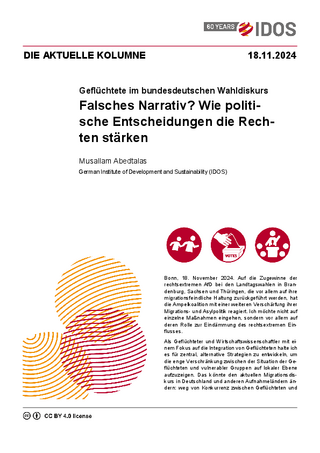
Refugees in the German elections’ discourse
Challenging the narrative: How policy choices empower the far-right
Abedtalas, MusallamThe Current Column (2024)
Bonn: German Institute of Development and Sustainability (IDOS), The Current Column of 18 November 2024
Bonn, 18 November 2024. Following the far-right AfD party's gains in last September's state elections in Brandenburg, Saxony, and Thuringia - largely attributed to its anti-immigrant stance - the ruling coalition has responded by more tightening its immigration and asylum policies. While I will not go into the specifics of these measures, it’s crucial to emphasise their implications for curbing the far-right's influence. From my perspective as a refugee and economist specialising in refugee integration, I believe it is crucial to explore alternative strategies that emphasise the interconnectedness of refugees and local vulnerable groups. This focus could help shift the discourse in Germany, and other refugee-hosting contexts, from competition to cooperation among refugees and hosts.
Rather than crafting innovative solutions that prioritise the shared interests and needs of refugees and marginalised groups within the host community, the ruling coalition has opted for a conventional reactive approach by tightening immigration policies—an approach that the AfD champions. By shifting the debate into the AfD’s core narrative of stricter immigration policies—the ruling coalition inadvertently strengthens the far-right. In essence, the original proponent of this narrative (the AfD) is likely to outshine its imitators (the ruling coalition) in advancing its agenda. This has been recently observed in Germany and several other countries that have attempted to counter the electoral rise of the far right by tightening immigration policies.
Instead of confronting the internal challenges of integrating migrants and addressing broader issues of inequality and inclusiveness, the government approached the situation as an external problem that could be resolved solely by restricting entry. Why has the ruling coalition chosen this path? I argue that the current approaches to migration, asylum, and integration—viewed through humanitarian and development perspectives—have not sufficiently contextualized these issues within the framework of the host society's lack of inclusivity.. This oversight may have influenced how these challenges are addressed.
Beyond socio-cultural concerns, these approaches fuel economic fears among vulnerable groups and stir anti-refugee sentiment. The humanitarian approach views refugees as vulnerable, requiring aid, which can strain the host country's limited resources and amplify local grievances. In contrast, the development approach emphasises refugees' right to work, seeing them as potential assets and advocating for their labour market integration. While this has made progress, it remains disconnected from the broader context of the host country, failing to alleviate fears of job competition. As a result, the refugee issue is framed as an external problem with internal consequences, shaping political discourse and policy decisions.
While acknowledging the importance of previous approaches, I argue that the development perspective must be adjusted to better address the internal dimensions of the refugee issue, ultimately alleviating concerns among vulnerable groups. For example, the contextualising of refugees’ access to labour market in the context of the right to work needs to be changed. Currently, there is reliance on Article 23 of the Universal Declaration of Human Rights and related international conventions, which highlight the right to work. Instead, the focus should be on Article 17, which underscores the property rights.
This shift would enable an assessment of how effectively host societies recognise the property rights of refugees over their own resources (the right to own, use and transfer). It could also broaden the understanding of these resources to encompass not only human resources, but also financial and material assets. This transition moves beyond merely examining refugees' access to the labour market; it involves questioning the inclusiveness of the host society’s social order and analysing the economic implications of property rights through the lens of network economies. For example, just as the value of a telephone network increases with the number of users, there is a possibility that recognising and integrating refugees’ resources with those of the host community can generate mutual benefits.
This approach will help identify barriers that hinder the acknowledgement of refugees' property rights and facilitate connections between their resources and those of the host community. With that, I argue, it will provide a comprehensive evaluation of the levels of trust and inclusiveness within the social order—key factors influencing politicians' flexibility, “room for maneuver”, in crafting institutions and policies that address both the recognition of refugees' property rights and the grievances of vulnerable groups.
This is not a call for open borders or for encouraging more refugees to come. Instead, it advocates for a proactive approach that focuses on the internal aspects of the issue. By aligning efforts to address both the refugee situation and local grievances, a more unified response could emerge, promoting integration and social cohesion. This shift may also reduce the electoral appeal of far-right parties.

